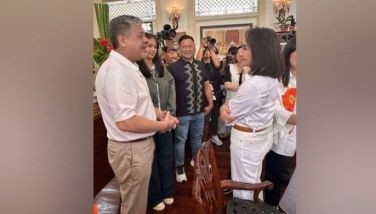Pastor Quiboloy and the separation between church and state
The Philippine Constitution provides: "The separation between Church and State shall be inviolable. No law shall be made respecting the establishment of any religion or prohibiting the free exercise thereof. The free exercise and enjoyment of religious profession and worship without discrimination shall forever be allowed."
The question being asked is this: Is the Constitution violated when a religious pastor is being investigated for acts not related to religion? My answer is a big “No”. By the decision of the Department of Justice to file charges against Apollo Quiboloy based on supposed prima facie evidence of alleged violations of the Revised Penal Code and other special penal statutes, the government is not invading into church activities because what is being subjected to prosecution here are not religious dogma or ecclesiastical practices but acts and omissions allegedly punishable by law. We need to study religious freedom and trace its legal and jurisprudential moorings.
In the landmark case of Estrada vs. Escritor in 2006, our Supreme Court speaking through the learned and erudite Justice Reynato Puno had to cite US jurisprudence and held: "Under the benevolent-neutrality theory, the principle underlying the First Amendment is that freedom to carry out one’s duties to a Supreme Being is an inalienable right, not one dependent on the grace of legislature. Religious freedom is seen as a substantive right and not merely a privilege against discriminatory legislation. With religion looked upon with benevolence and not hostility, benevolent neutrality allows accommodation of religion under certain circumstance." But, we hasten to interject that this benevolent neutrality does not justify the commission of criminal acts not related to religion.
Justice Puno explained in Estrada vs. Escritor:" If the plaintiff can show that a law or government practice inhibits the free exercise of his religious beliefs, the burden shifts to the government to demonstrate that the law or practice is necessary to the accomplishment of some important (or ‘compelling’) secular objective and that it is the least restrictive means of achieving that objective. If the plaintiff meets this burden and the government does not, the plaintiff is entitled to exemption from the law or practice at issue. In order to be protected, the claimant’s beliefs must be ‘sincere’, but they need not necessarily be consistent, coherent, clearly articulated, or congruent with those of the claimant’s religious denomination. ‘Only beliefs rooted in religion are protected by the Free Exercise Clause’; secular beliefs, however sincere and conscientious, do not suffice."
Based on the above parameters, I submit, with due respect, that neither the Senate investigation led by Senator Riza Hontiveros, nor the DOJ decision to prosecute Apollo Quiboloy violate the principle of separation between church and state. Much less do they violate Quiboloy's freedom of religion. Whenever a son of God violates the law of God, his Father shall apply the law on him. And when he violates the law of Caesar, he is answerable to Caesar. No one is above the law. We are a government of laws and not a government of powerful men like Teves and Quiboloy.
Pastor Quiboloy should be reminded that even the Lord Jesus submitted himself to the jurisdiction of Caesar's governor in Israel, Pontius Pilate. And so, let the forces of justice proceed though the heavens may fall.
- Latest



















